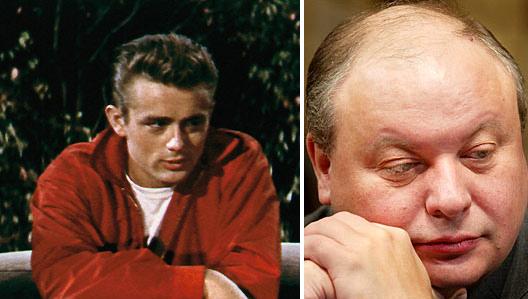
Like James Dean, Yegor Gaidar lived hard and died young.
But unlike Dean, the only victim of whose reckless driving was himself, the man who privatised Russia’s economy in the 1990s took his entire young country on a deadly joyride that wrecked millions of lives.
That’s no hyperbole: The Lancet has determined that the Gaidar-engineered mass-privatisation led to a 13% increase in the death rate, leading over 3 million people to die prematurely. 
As if that wasnt enough, even Luke Harding points out that “in January 1992 [Gaidar] abolished state control of prices, wiping out the rouble savings of millions of ordinary Russians overnight. His reforms were described as shock therapy. They paved the way for the dubious state privatisations of the 1990s and the rise of the oligarchs”.
Predictably, the Voice of America’s headline for the obituary reads: Gaidar died believing in the inevitabiliy of Russian democracy”.
A man like Gaidar could only have emerged from the muck of Hobbesan early 90s Russia, a rancid petrie dish incubating malignant strains of bandits and opportunists.
But in fairness, he was not a bandit like Alfred Koch, or a bandit-opportunist like his stablemate Anatoly Chubais. A minister in his early thirties, he was a romantic, Randian megalomaniac; carried away, like many smart young people, not by malice but by a conviction in his own infallibility and that of his free market shibboleths. Chillngly,  the young Gaidar was a lot like Larry Summers.
the young Gaidar was a lot like Larry Summers.
Like his grandfather, the Bolshevik and Soviet children’s writer Arkady Gaidar, Yegor believed that he was ‘on the right side of history’; but whereas Arkady’s writing provided some counterbalance of empathy, Yegor quickly lost any connection he may have ever felt towards those on the receiving end of his theoretical postulates.
Yet today’s Russia remains built in his image, evidenced by the fawning official reaction to his death: Putin called Gaidar’s death a “heavy loss for Russia.”
But Gaidar, ‘who served as acting prime minister for just six months in 1992 before public anger forced Yeltsin to fire him’, continues to be despised by most Russians, so there was no populist gain to be had in singing his praises. And yet today the Kremlin finds itself on the same side as its favoured liberal punching bags Nemtsov et al. Why?
Because the Putin government is the direct descendant of the Gaidar-Yeltsin right-wing economic philosophy. Thus it came as no surprise to read that “after leaving politics, he remained influential behind the scenes, offering informal advice to Vladimir Putin on a range of economic issues”. Or that his daughter had become a cog in Putin’s power vertical.
Because, for all the political animus between Putin’s siloviki and the liberal democrats, they are bound together by their Gaidarist love for capitalism and contempt for the people.
So what to make of the man Mark Ames eulogised a decade ago as “the frog-faced architect of ‘reform’ and ‘shock therapy’ and every other curse word associated with capitalism in Russia…the guy responsible for shaking down the entire russian population and handing over their belongings to a few well-placed comrades, [who] will go down in Russian folklore as one of the most terrifyoing villains ever to set foot on Mother Rus – [and whose] name will be invoked by parents to scare children into going to bed and brushing their teeth.”
It’s about time Russians started taking care of their teeth.